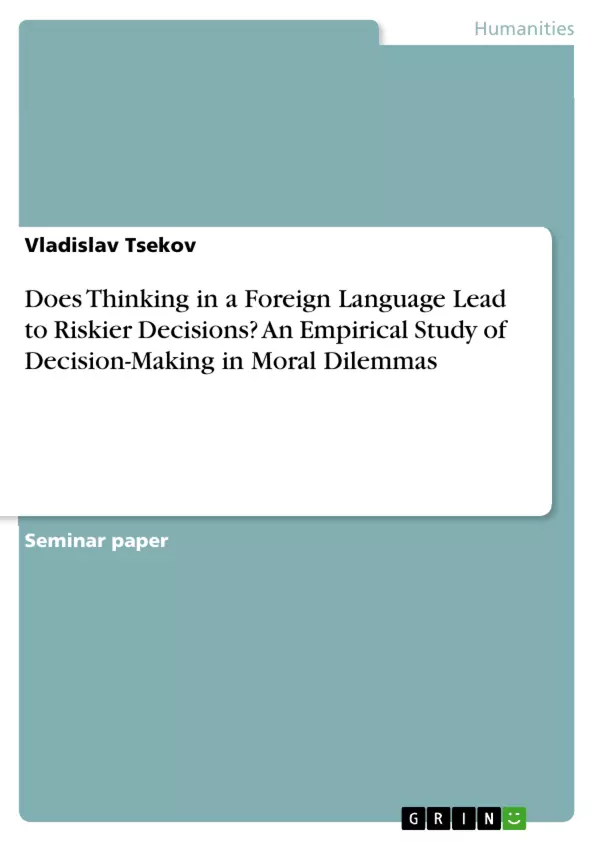Millions of people around the world use foreign languages for communication on a daily basis. Not being on the same level of proficiency as the mother tongue, thinking in a foreign language can lead to changes in the decision-making process. We tested to see whether thinking in a foreign language influences risk and moral judgments. German and English natives completed an online study either in their native or in a foreign language.
Results indicate that participants answering in a foreign language were more risk seeking. No language effect was found for people’s moral judgments. These findings support the hypothesis that a foreign language puts more cognitive load on the brain and thus leaves less capacity available for rational decision-making.
Inhaltsverzeichnis (Table of Contents)
- Abstract
- Thinking in a Foreign Language Leads to Riskier Decisions
- Method
- Participants
- Procedure
- Results and Discussion
- Risk scenario 1: Ebola
- Risk scenario 2: Lottery
- Risk scenario 3: Fire in building
- Risk scenario 4: Africa Safari
- Moral Dilemmas
- Risk Matrix
- General Discussion
- References
- Appendix A: Risk Scenarios
- Appendix B: Moral dilemmas
- Appendix C: Risk Matrix
Zielsetzung und Themenschwerpunkte (Objectives and Key Themes)
This study aims to investigate the influence of thinking in a foreign language on risk and moral judgments. The researchers examine whether individuals exhibit differences in their decision-making processes when using a foreign language compared to their native tongue.
- The impact of language proficiency on risk perception and decision-making
- The role of cognitive load in influencing risk-taking behavior
- The relationship between language and emotional processing in moral judgments
- The potential for foreign language use to affect rationality and emotional distance
- The comparison of findings to previous research on language and decision-making
Zusammenfassung der Kapitel (Chapter Summaries)
The study begins by introducing the concept of language proficiency and its potential influence on decision-making processes. It explores the two systems of thinking and how they relate to native and foreign language use. The study then outlines the methods used, including participant demographics, procedure, and experimental design.
The "Results and Discussion" section focuses on the analysis of risk scenarios. It investigates the influence of language on participants' responses to different risk situations. The study examines the relationship between language and risk-seeking behavior in various scenarios, such as the "Asian Disease" problem and hypothetical situations with varying probabilities.
The study also explores the potential impact of language on moral judgments. However, the preview does not include details about the specific moral dilemmas used in the study or the findings related to them.
Schlüsselwörter (Keywords)
The study focuses on the interplay between language, risk, decision-making, moral judgment, and cognitive load. The study examines how language proficiency can affect risk perception, decision-making processes, and the emotional processing involved in moral judgments.
Frequently Asked Questions
Does thinking in a foreign language lead to riskier decisions?
According to the study's results, participants answering in a foreign language were generally more risk-seeking compared to those using their native language.
Does the language used affect moral judgments?
No, the study found no significant language effect on the moral judgments of the participants.
What is the reason for increased risk-taking in a foreign language?
The findings support the hypothesis that a foreign language increases cognitive load, leaving less capacity for rational decision-making and increasing emotional distance.
Which risk scenarios were tested in the study?
The researchers used scenarios involving an Ebola outbreak, a lottery, a fire in a building, and an African safari to measure risk behavior.
Who participated in this empirical study?
The study involved native speakers of German and English who completed an online survey in either their native or a foreign language.
- Citar trabajo
- Vladislav Tsekov (Autor), 2015, Does Thinking in a Foreign Language Lead to Riskier Decisions? An Empirical Study of Decision-Making in Moral Dilemmas, Múnich, GRIN Verlag, https://www.grin.com/document/356503



